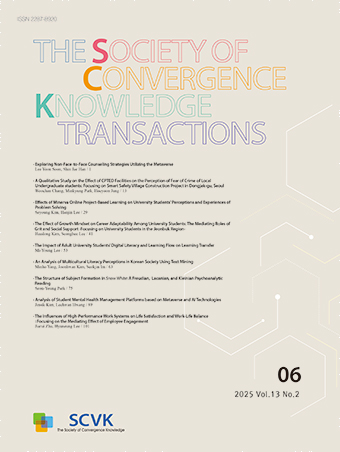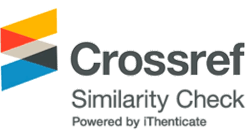Research Article
Abstract
References
Information
본 연구는 신규간호사를 대상으로 극복력에 영향을 미치는 요인들을 파악하여 신규간호사의 극복력 증진을 도모하기 위한 기초자료를 제공하고자 시도된 모형검증 연구이다. 본 연구는 수도권 소재 5개 대학병원에 근무 중인 총 임상 경력 1년 이하 신규간호사 211명을 대상으로 설문을 시행하였다. 자료 분석을 하기 위해 SPSS 26.0 program과 AMOS 26.0 program을 이용하였으며 결과를 요약하면 다음과 같다. 최종모형의 적합도는 χ2=203.78(p<.001), df=106, χ2/df=1.92, RMR=0.02, SRMR=0.06, RMSEA=0.07, TLI=0.91, CFI=0.94, AGFI=0.85(GFI=0.91)로 나타나 적합한 모형의 기준을 충족한 것으로 나타났다. 최종모형 검증결과, 신규간호사의 극복력에 직접적인 영향을 미치는 요인은 사회적 지지, 희망, 외상 후 성장이었고 총 효과에서는 신규간호사의 희망이 높고, 외상 후 성장과 직무 성취감이 높을 때 극복력이 높다는 것이 확인되었다. 간접적으로는 신규간호사가 대처를 잘할수록 외상 후 성장이 높고, 외상 후 성장이 높아지면 극복력이 높아진다는 것이 확인되었다. 높은 사회적 지지와 희망, 낮은 직무 스트레스가 직무 성취감을 높이고, 직무 성취감이 높을 때 외상 후 성장이 높아지며, 외상 후 성장이 높을 때 극복력이 높은 것이 확인되었다. 지각된 건강상태, 사회적 지지, 대처, 희망, 직무 스트레스, 직무 성취감, 외상 후 성장의 극복력에 대한 설명력은 61.7%이었다.
Purpose: The purpose of this study was to identify factors affecting resilience and to construct a structural model for resilience of new graduate nurses. The model was based on the Polk’s middle-range theory of resilience and literature review. Methods: Data were collected by using a structured questionnaire, which included perceived health status, social support, coping, hope, job-stress, job achievement, post-traumatic growth and resilience. Participants were 211 new graduate nurses. The data were analyzed using SPSS/WIN 26.0 program for descriptive statistics and AMOS 26.0 program for structural equation modeling. Results: Hope, post-traumatic growth and social support had significant direct effect on resilience. But, Social support had no significant total effect on resilience. Job achievement had significant indirect and total effect on resilience. Coping had only significant indirect effect on resilience. Job-stress had only significant direct effect on job achievement. but, Perceived health status was not significant at all. These variables explained 61.7% of total variance of resilience in new graduate nurses. Conclusion: Strategies for improving hope, post-traumatic growth and job achievement will be helpful for enhancing resilience of new graduate nurses.
- https://khna.or.kr/home/pds/utilities.php
- R. F. AbuAlRub, "Job Stress, Job Performance, and Social Support among Hospital Nurses", Journal of Nursing Scholarship, Vol. 36, No. 1, pp. 73-78, 2004.https://doi.org/10.1111/j.1547-5069.2004.04016.xPMid:15098422
- T. B. Pipe, V. L. Buchda, S. Launder, B. Hudak, L. Hulvey, K. E. Karns, and D. Pendergast, "Building Personal and Professional Resources of Resilience and Agility in the Healthcare Work Place", Stress and Health, Vol. 28, pp. 11-22, 2012.https://doi.org/10.1002/smi.1396PMid:22259154
- http://www.koreanurse.or.kr/board/board_read.php?board_id=policy&no=58
- M. Kramer, "Reality Shock; Why Nurses Leave Nursing", Saint Louis: CV Mosby, pp. 891, 1974.https://doi.org/10.1097/00000446-197505000-00041
- 강경아, 박성희, "임상간호사의 자기효능감 및 직무스트레스 대처가 극복력에 미치는 영향", 한국산학기술학회논문지, 제19권 제6호, pp.549-558, 2018.
- https://www.webster-dictionary.org/definition/resilience.
- D. Jackson, A. Firtko, and M. Edenborough, "Personal Resilience as a Strategy for Surviving and Thriving in the Face of Work Place Adversity: A Literature Review", Journal of Advanced Nursing, Vol. 60, No. 1, pp. 1-9, 2007.https://doi.org/10.1111/j.1365-2648.2007.04412.xPMid:17824934
- 박정옥, 이미정, 김경자, 장봉희, 유문숙, "신입간호사의 회복탄력성, 직무스트레스 및 소진", 가정간호학회지, 제20권 제2호, pp.124-132, 2013.
- 박소연, 권윤희, 박영숙, "신규간호사의 회복탄력성과 조직사회화", 한국콘텐츠학회논문지, 제15권 제2호, pp.324-332, 2015.https://doi.org/10.5392/JKCA.2015.15.02.324
- 진승희, 김정희, "간호사의 회복탄력성과 지각된 개인 및 조직의 지지가 조직몰입에 미치는 영향", 디지털융복합연구, 제15권 제5호, pp.293-303, 2017.
- 권문경, 이숙, 김연정, "간호사의 외상 후 성장, 외상사건경험 및 인지정서조절 간 관계", 스트레스연구, 제26권 제1호, pp.31-37, 2018.
- 정미라, 정은, "임상간호사의 직무 스트레스, 이직의도 및 생동성이 리질리언스(Resilience)에 미치는 융복합적 요인", 디지털융합학회지, 제15권 제6호, pp.305-314, 2017.
- L. V. Polk, "Toward a Middle-Range Theory of Resilience", Advanced in Nursing, Vol. 19, No. 3, pp. 1-13, 1997.https://doi.org/10.1097/00012272-199703000-00002PMid:9055026
- 황은희, "신규간호사와 경력간호사의 극복력 비교", 한국산학기술학회논문지, 제19권 제10호, pp.530-539, 2018.
- 김학순, "남 ‧ 여 고등학생들의 건강에 대한 연구", 한국학교보건학회지, 제6권 제2호, pp.89-100, 1993.
- 김근령, 이해정, 조영숙, 김명희, "신규간호사의 이직 결정 경험", 질적연구, 제14권 제1호, pp.23-33, 2013.https://doi.org/10.22284/qr.2013.14.1.23
- L. Campbell-Sill, S. L. Cohan, and M. B. Stein, "Relationship of Resilience to Personality, Coping, and Psychiatric Symptoms in Young Adults", Behaviour Research and Therapy, Vol. 44, No. 4, pp. 585-599, 2006.https://doi.org/10.1016/j.brat.2005.05.001PMid:15998508
- 구본진, "중년 여성의 극복력, 희망, 부부친밀감 및 가족지지가 삶의 질에 미치는 영향", 정신간호학회지, 제17권 제4호, pp.421-430, 2008.
- 공명수, "투석환자의 희망과 극복력(Resilience)에 관한 연구", Health & Nursing, 제21권 제1호, pp.24-37, 2009.
- M. L. Nowotny, "Assessment of Hope in Patients with Cancer: Development of an Instrument", Oncology Nursing Forum, Vol. 16, No. 1, pp. 57-61, 1989.
- K. Reivich, and A. Shatte, "The Resilience Factor: Seven Essential Skills for Overcoming Life's Inevitable Obstacles", New York (NY): Broadway Books, pp. 1-342, 2003.
- 김주환, "회복탄력성", 위즈덤하우스, 고양, pp.1-267, 2019.https://doi.org/10.22510/kjofm.2019.36.2.001
- G. A. Bonanno, "Loss, Trauma, and Human Resilience: Have We Underestimated the Human Capacity to Thrive after Extremely Aversive Events?", American Psychologist, Vol. 59, No. 1, pp. 20-28, 2004.https://doi.org/10.1037/0003-066X.59.1.20PMid:14736317
- M. Kramer, B. B. Brewer, and P. Maguire, "Impact of Healthy Work Environments on New Graduate Nurses' Environmental Reality Shock", Western Journal of Nursing Research, Vol. 35, No. 3, pp. 348-383, 2013.https://doi.org/10.1177/0193945911403939PMid:21498813
- 김계수, "AMOS 18.0 구조방정식 모형 분석", 한나래아카데미, 서울, pp.1-663, 2010.
- 송승훈, 김교헌, 권선중, 이홍석, "한국판 외상 후 성장 척도(K-PTGI)의 신뢰도와 타당도", 한국심리학회 학술대회 자료집, 제1권, pp.252-253, 2006.
- 정혜경, "간호사의 전문직업성과 직무성취감이 이직 및 경력중단에 미치는 영향", 박사학위논문, 대구한의대학교, 대구, pp.1-80, 2016.
- D. L. Speake, M. E. Cowart, and K. Pellet, "Health Perceptions and Lifestyles of the Elderly", Research in Nursing & Health, Vol. 12, No. 2, pp. 93-100, 1989.https://doi.org/10.1002/nur.4770120206PMid:2704843
- 김수경, "프리셉터 간호사의 소진, 사회적 지지 및 임파워먼트의 관계", 석사학위논문, 아주대학교, 경기, pp.1-59, 2017.
- 오수성, 신현균, "5 ‧ 18 피해자들의 생활스트레스, 대처방식, 지각된 사회적 지지와 외상후 스트레스, 심리건강 간 관계", 한국정신학회지, 제27권 제3호, pp.595-611, 2008.
- 강이영, 김남성, "상담과정 희망척도의 개발과 적용", 한국심리학회 학술대회 자료집, 제1권, pp.453-454, 2003.
- 유옥임, "신규간호사 예비교육 만족도와 스트레스 정도에 관한 연구", 석사학위논문, 경희대학교 행정대학원, 서울, pp.1-61, 2000.
- J. F. Hair, W. C. Black, B. J. Babin, R. E. Anderson, and R. L. Tatham, "Multivariate Data Analysis, 6th edition", Upper Saddle River (NU): Pearson Prentice Hall, pp. 1-928, 2006.
- 허준, "허준의 쉽게 따라하는 AMOS 구조방정식 모형", 한나래아카데미, 서울, pp.1-251, 2013.
- 강현철, "SPSS/AMOS를 활용한 구조방적식 모형 분석과 응용", 자유아카데미, 파주, pp.1-322, 2019.
- 고정옥, 박숙경, 이명하, "임상 간호사의 긍정심리역량이 소진에 미치는 영향", 간호행정학회지, 제19권 제2호, pp.304-314, 2013.
- B. R. Sarason, I. G. Sarason, and G. R. Pierce, "Social Support: An international View (Eds.)", Newyork: Wile, pp. 39-50, 1990.
- 김미자, "간호대학생의 감성지능, 회복탄력성, 외상 후 성장이 의사소통능력에 미치는 영향", 산업융합연구, 제16권 제3호, pp.23-32, 2018.
- Will Pye, "Translated by Eunah Choi. A miracle of thanksgiving three lines a day that changes life", Seoul: Forest Books, pp. 212, 2019.
- J. M. Black, "성인간호학1", 정담미디어, 서울, pp.1096, 2013.
- 김미경, 권인각, "신입간호사와 프리셉터 간 갈등경험에 따른 프리셉터의 핵심역량", 한국간호교육학회지, 제13권 제2호, pp.237-245, 2007.
- Publisher :The Society of Convergence Knowledge
- Publisher(Ko) :융복합지식학회
- Journal Title :The Society of Convergence Knowledge Transactions
- Journal Title(Ko) :융복합지식학회논문지
- Volume : 9
- No :4
- Pages :95-110
- DOI :https://doi.org/10.22716/sckt.2021.9.4.047




 The Society of Convergence Knowledge Transactions
The Society of Convergence Knowledge Transactions







